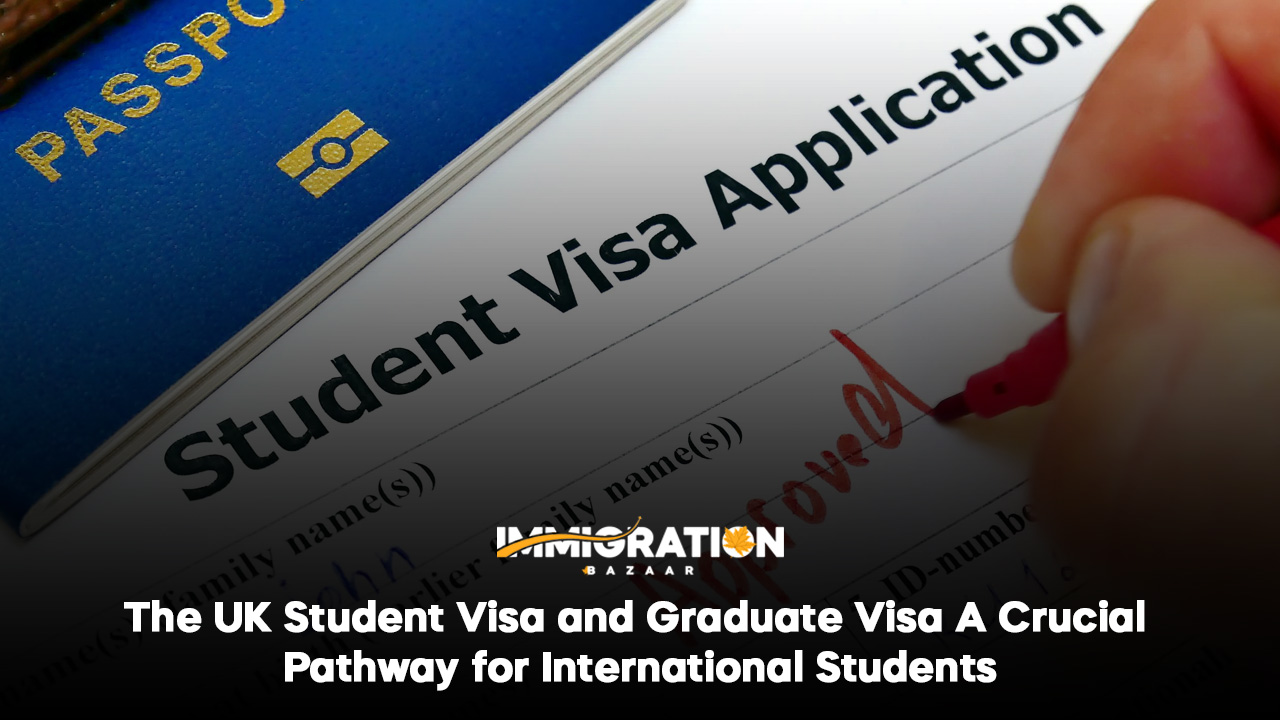The United Kingdom has long been a preferred destination for international students, particularly for those seeking higher education in fields like engineering, business, technology, and healthcare. The country’s prestigious universities, such as Oxford, Cambridge, and Imperial College London, have attracted students from across the globe, making the UK a hub for world-class education. One of the most significant reasons behind the UK’s appeal to international students is the relatively straightforward post-study work opportunities, especially through the Graduate Visa, which allows students to stay in the UK after their studies and work for a specified period.
However, in recent times, there has been growing uncertainty surrounding the UK’s post-study visa policies, particularly the Graduate Visa, leading to concerns that it might be discontinued or significantly altered. These concerns arose following a review initiated by the UK’s Home Secretary, who sought the opinion of the Migration Advisory Committee (MAC) on whether the Graduate Visa could be used as a path for permanent residency or a long-term work permit.
In light of this context, the MAC has now released its findings, which seem to provide some reassurance to students and universities alike. The Committee’s review concluded that there is no strong evidence suggesting that the Graduate Visa is being misused for long-term residency. Furthermore, the demand for UK student visas has fluctuated due to various rule changes, but the education sector is still poised for growth, especially with ongoing reforms aimed at making the UK more attractive to international students. This article provides an in-depth analysis of the UK’s current visa policies, the future of the Graduate Visa, and how these changes could impact both students and the UK’s education sector.
-
The UK Student Visa and Graduate Visa: A Crucial Pathway for International Students
A. The Appeal of the UK’s Education System
The UK has been a leader in global education for centuries. With world-renowned universities, state-of-the-art research facilities, and diverse academic offerings, the country continues to attract students from across the globe. One of the main factors contributing to the UK’s popularity is its emphasis on quality education, its historical academic reputation, and its global standing in research and innovation.
In addition to the prestige of UK universities, the country has also provided international students with relatively clear and accessible post-study work opportunities. The Graduate Visa, introduced in July 2021, allows international students who have completed a degree in the UK to stay and work for up to two years (three years for doctoral graduates). This visa has been particularly popular as it provides students with time to gain work experience, build a career, and potentially transition to a more permanent visa category.
B. The Importance of the Graduate Visa for International Students
The Graduate Visa is one of the most important features of the UK’s immigration system for international students. It offers flexibility and gives students the freedom to explore job opportunities in the UK after completing their studies. Unlike other work visas, the Graduate Visa does not require sponsorship from an employer, allowing graduates to work in any sector and at any skill level during the validity of their visa.
For many students, the availability of the Graduate Visa is a deciding factor when choosing to study in the UK. It allows them to recover some of the significant financial investment they make in their education by working in the UK for a few years after graduation. This period also enables students to potentially find employers willing to sponsor them for a Skilled Worker Visa, a more permanent work visa that can eventually lead to settlement in the UK.
-
The Migration Advisory Committee Review: Key Findings and Implications
A. Why Was the Review Initiated?
In recent months, there has been speculation that the UK government might impose restrictions on the Graduate Visa or even discontinue it altogether. Concerns about rising immigration numbers and the potential misuse of the visa prompted Suella Braverman, the UK’s Home Secretary, to ask the Migration Advisory Committee (MAC) to conduct a review of the visa’s impact and its potential use as a pathway for long-term residency.
The review sought to understand whether the visa was being used as a backdoor to permanent residency or if it was fulfilling its original purpose of providing short-term post-study work opportunities. It also examined whether the visa was contributing to rising immigration numbers in a way that could negatively impact the UK’s domestic job market.
B. The MAC’s Findings
The Migration Advisory Committee concluded that there is no substantial evidence to suggest that the Graduate Visa is being used as a path to long-term residency or permanent settlement in the UK. The Committee found that the visa is predominantly being used as intended: to allow international students to gain work experience in the UK for a limited period after graduation.
Additionally, the MAC found that the demand for student visas has slightly declined due to changes in the rules, particularly the introduction of stricter requirements for dependents of students and English language proficiency tests. However, this decline is not expected to have a long-term impact on the UK’s education sector, especially with ongoing efforts to boost the attractiveness of UK universities and education institutions.
The Committee also pointed out that the UK’s education sector plays a significant role in the country’s economy, and restricting or discontinuing the Graduate Visa could have negative financial consequences. International students contribute billions of pounds to the UK economy each year through tuition fees, accommodation, and living expenses. Moreover, many universities heavily rely on international student tuition to fund their operations, research, and development programs.
C. Recommendations from the MAC
Given these findings, the Migration Advisory Committee has recommended that the Graduate Visa should remain in place without significant changes. The Committee emphasized that the visa is an essential component of the UK’s higher education system and helps attract high-quality international students who contribute both academically and economically.
Furthermore, the MAC suggested that the government should consider making the visa more attractive by streamlining the application process and extending the length of the visa for certain sectors where the UK faces skills shortages. For example, graduates in fields like engineering, data science, healthcare, and technology could be given an extended period to work in the UK, particularly in light of ongoing workforce shortages in these industries.
-
Implications for International Students and the UK’s Education Sector
The findings from the MAC review are reassuring for international students who are currently studying in the UK or planning to apply for UK student visas in the near future. The Graduate Visa remains a key factor in attracting students to the UK, and its continuation will ensure that the country remains a top choice for international education.
A. Increased Confidence for Students
For international students, the news that there will be no significant changes to the Graduate Visa is a relief. The ability to work in the UK after completing their studies is a major incentive for students, particularly those coming from countries like India, China, and Nigeria, where competition for jobs in their home countries is intense. The Graduate Visa provides students with the opportunity to gain international work experience, build professional networks, and improve their career prospects.
The lack of major changes also means that students can plan their education and post-study careers with greater certainty. Many students have expressed concerns in recent months that the UK might follow other countries in tightening its post-study visa policies, which would have made the UK less attractive compared to competitors like Canada, Australia, and the United States. However, with the Graduate Visa remaining in place, students can continue to view the UK as a viable option for both education and early-career development.
B. Impact on the UK Education Sector
The UK’s higher education sector is one of the most important contributors to the country’s economy, and international students play a significant role in maintaining the financial stability of many universities. The decision to maintain the Graduate Visa will ensure that the flow of international students to the UK continues, which is crucial for the sector’s growth and sustainability.
In addition to providing a financial boost, international students contribute to the diversity and vibrancy of UK universities. They bring different perspectives, cultures, and ideas, which enrich the academic experience for all students and help foster global cooperation and understanding.
The UK’s ability to attract and retain top talent from around the world also benefits its economy more broadly. Many international students go on to work in industries where the UK faces skills shortages, such as healthcare, engineering, and technology. By allowing students to stay in the UK for a limited period after their studies, the country can benefit from their skills and expertise before they either return to their home countries or transition to longer-term work visas.
-
The Global Context: Competing for International Students
The decision to maintain the Graduate Visa comes at a time when many other countries are also competing to attract international students. Countries like Canada, Australia, and the United States have all introduced policies aimed at making their education systems more attractive to international students, particularly those from Asia and Africa.
A. Canada’s Open and Welcoming Approach
Canada, for example, has long been known for its welcoming approach to international students. The country offers a Post-Graduation Work Permit (PGWP) that allows students to work in Canada for up to three years after completing their studies. This flexibility, combined with Canada’s clear pathway to permanent residency, has made it a top destination for international students, particularly from countries like India and China.
B. Australia’s Evolving Visa Policies
Similarly, Australia has been continuously evolving its visa policies to attract more international students. In addition to offering a Temporary Graduate Visa that allows students to stay and work in Australia for two to four years after graduation, the country recently announced a new Innovation Visa to replace the Global Talent Visa program. This move signals Australia’s commitment to attracting high-skilled workers and ensuring that international students can continue to contribute to the country’s economy.







